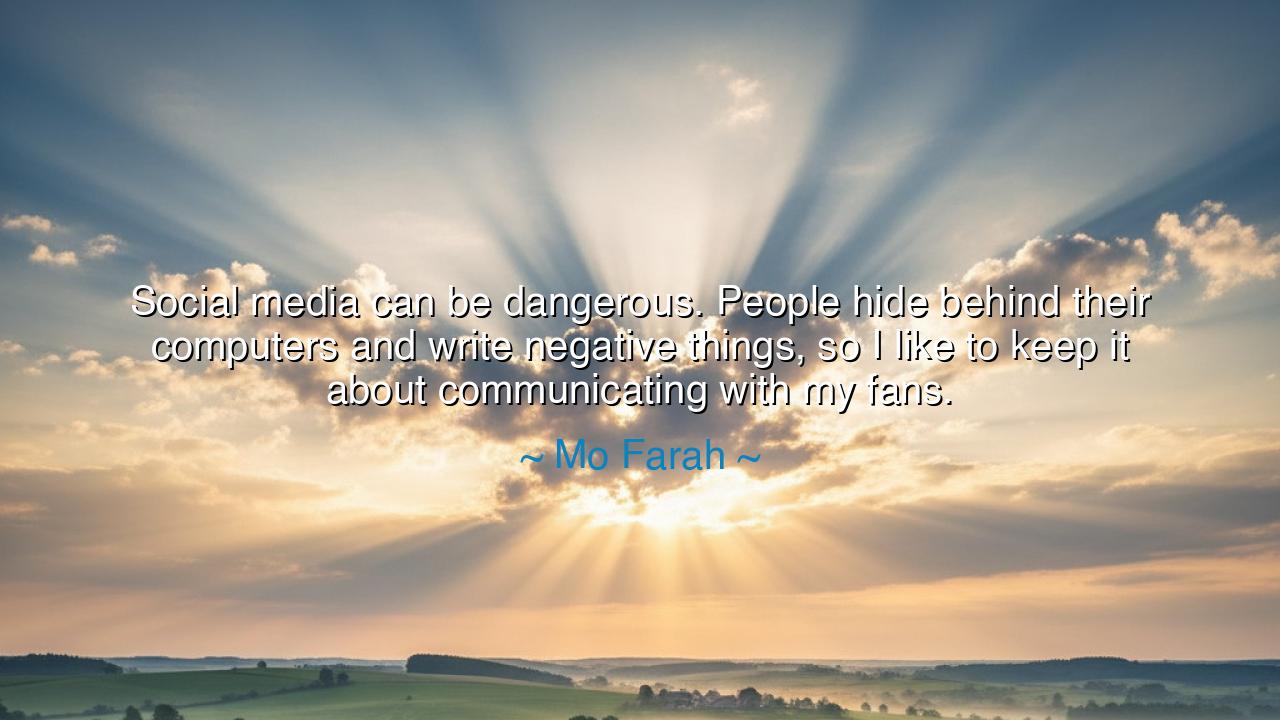
Social media can be dangerous. People hide behind their computers
Social media can be dangerous. People hide behind their computers and write negative things, so I like to keep it about communicating with my fans.






In the ever-evolving world of communication, there arises a new force, one that transcends the ancient methods of discourse—the digital realm. Mo Farah, an athlete whose accomplishments have brought him into the public eye, has wisely observed, “Social media can be dangerous. People hide behind their computers and write negative things, so I like to keep it about communicating with my fans.” These words echo a truth that resonates not only in the age of social media but in all ages where the voice of the many is amplified, sometimes at the cost of virtue, wisdom, and humanity.
The advent of social media has given every person a platform to be heard. Yet, this gift, like all powerful forces, comes with its own perils. Just as the ancient orators would stand before the masses to speak words that could either uplift or incite, so too does the internet carry the potential for both greatness and harm. Farah's words call us to recognize that in the digital world, many choose to hide behind the veil of anonymity, crafting words that can wound, tear down, and distort, without ever facing the consequences of their actions. There is power in speech, yes—but even more in the intent behind it.
In the time of Athens, the great Socrates walked the streets, speaking his truth to those who would listen. Yet, even Socrates was not immune to the dangers of words spoken without accountability. The voices of his critics, who could never confront him face-to-face, spread venomous slander and sought to destroy the very essence of his work. His trial and eventual execution came, in part, from the reckless use of words—words that were used to manipulate, to deceive, and to destroy without compassion or understanding. In many ways, the anonymity of the modern digital world resembles the ancient whispers of slander, hidden in the shadows of words that hurt without fear of retribution.
Farah’s choice to focus on communicating with his fans is a powerful reminder of the true purpose of connection. To engage with others—whether in the realm of sport, art, or thought—is to form bonds built on trust, admiration, and mutual respect. True communication is not about hiding behind screens, nor is it about attacking or belittling others. It is about the genuine exchange of ideas, the uplifting of those around us, and the nourishing of relationships that transcend the shallow and fleeting. Just as the great leaders of old—Alexander, Gandhi, or Martin Luther King Jr.—did not seek to inflame or degrade, but rather to inspire and unite, so too must we approach our interactions with dignity and purpose.
Consider the story of Mahatma Gandhi, whose words, like Farah’s, were not meant to hurt or tear down, but to build up. He stood before the world not in a digital space, but in the streets of India, facing those who sought to break his spirit, to crush his cause. Yet, Gandhi’s words carried the weight of peace, truth, and compassion, and through these principles, he led a nation to freedom. His words were not without criticism, nor were they free from those who would seek to destroy him. Yet, Gandhi never responded with negativity; he remained true to his mission, knowing that the path of virtue would always rise above the chaos of hatred.
The power of social media, like all tools, lies not in the platform itself but in how it is used. Just as the sword can be used to defend the innocent or to destroy, so too can the internet be wielded for good or for harm. Farah’s words urge us to remember that our digital voices must be used to elevate, not to tear down. In a world where criticism can be hurled without consequence, where opinions can be masked by anonymity, we must choose to rise above the fray. The true measure of character is not in how we engage with the anonymous, but in how we communicate with those we seek to build up—our fans, our friends, our communities.
The lesson is clear: communication is not merely a tool for exchange—it is a sacred trust. Farah teaches us that we must use our voices for connection, for understanding, and for empowerment. Let us, like the wise philosophers of old, choose our words carefully, for they can either tear apart the fabric of society or weave it together in harmony. In the world of social media, where words can travel faster than the speed of light, let us choose to uplift, to inspire, and to communicate with honor. For in doing so, we will not only protect the sanctity of our digital spaces but also the very essence of human connection itself.






AAdministratorAdministrator
Welcome, honored guests. Please leave a comment, we will respond soon